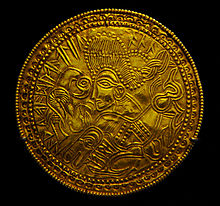 Global Information
Global InformationGermanic paganism information

| Part of a series on |
| Indo-European topics |
|---|
 |
Germanic paganism or Germanic religion refers to the traditional, culturally significant religion of the Germanic peoples. With a chronological range of at least one thousand years in an area covering Scandinavia, the British Isles, modern Germany, and at times other parts of Europe, the beliefs and practices of Germanic paganism varied. Scholars typically assume some degree of continuity between Roman-era beliefs and those found in Norse paganism, as well as between Germanic religion and reconstructed Indo-European religion and post-conversion folklore, though the precise degree and details of this continuity are subjects of debate. Germanic religion was influenced by neighboring cultures, including that of the Celts, the Romans, and, later, by the Christian religion. Very few sources exist that were written by pagan adherents themselves; instead, most were written by outsiders and can thus present problems for reconstructing authentic Germanic beliefs and practices.
Some basic aspects of Germanic belief can be reconstructed, including the existence of one or more origin myths, the existence of a myth of the end of the world, a general belief in the inhabited world being a "middle-earth", as well as some aspects of belief in fate and the afterlife. The Germanic peoples believed in a multitude of gods, and in other supernatural beings such as jötnar (often glossed as giants), dwarfs, elves, and dragons. Roman-era sources, using Roman names, mention several important male gods, as well as several goddesses such as Nerthus and the matronae. Early medieval sources identify a pantheon consisting of the gods *Wodanaz (Odin), *Thunraz (Thor), *Tiwaz (Tyr), and *Frijjō (Frigg),[a] as well as numerous other gods, many of whom are only attested from Norse sources (see Proto-Germanic folklore).
Textual and archaeological sources allow the reconstruction of aspects of Germanic ritual and practice. These include well-attested burial practices, which likely had religious significance, such as rich grave goods and the burial in ships or wagons. Wooden carved figures that may represent gods have been discovered in bogs throughout northern Europe, and rich sacrificial deposits, including objects, animals, and human remains, have been discovered in springs, bogs, and under the foundations of new structures. Evidence for sacred places includes not only natural locations such as sacred groves but also early evidence for the construction of structures such as temples and the worship of standing poles in some places. Other known Germanic religious practices include divination and magic, and there is some evidence for festivals and the existence of priests.
- ^ Simek 1993, p. 278.
Cite error: There are <ref group=lower-alpha> tags or {{efn}} templates on this page, but the references will not show without a {{reflist|group=lower-alpha}} template or {{notelist}} template (see the help page).